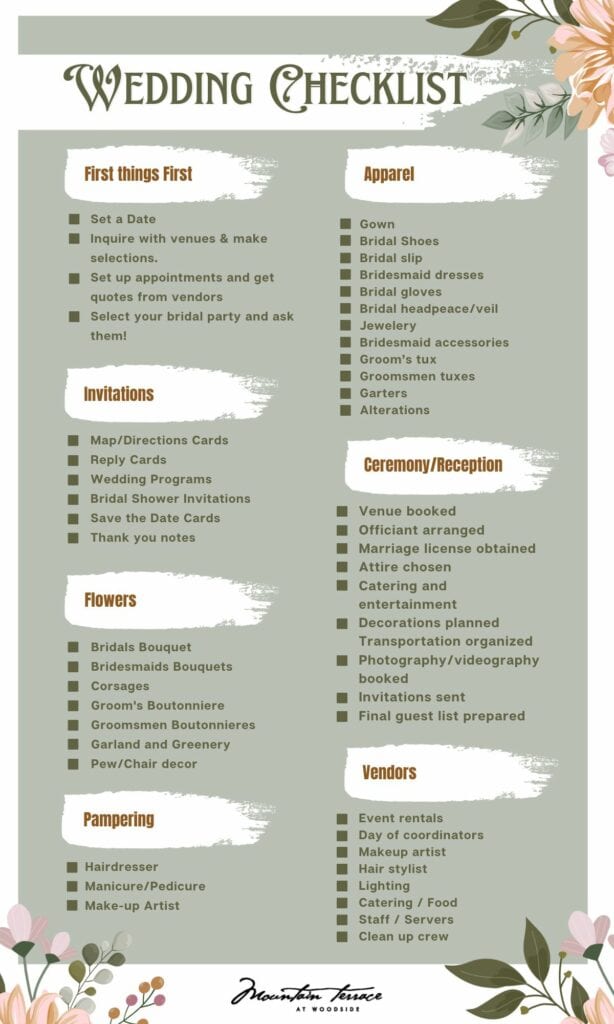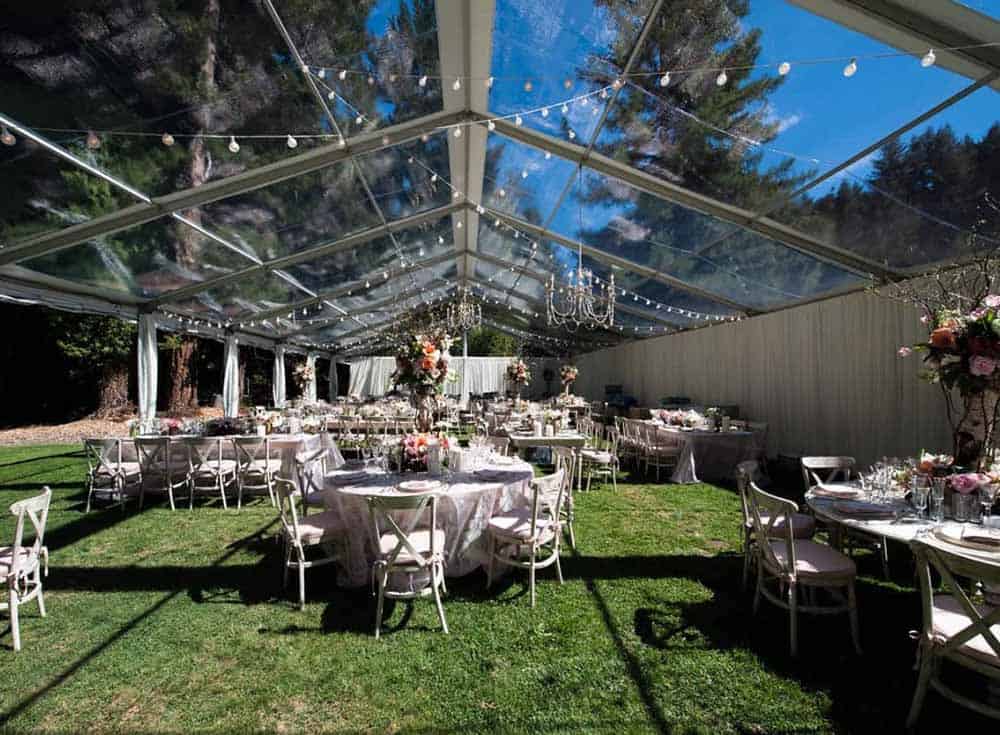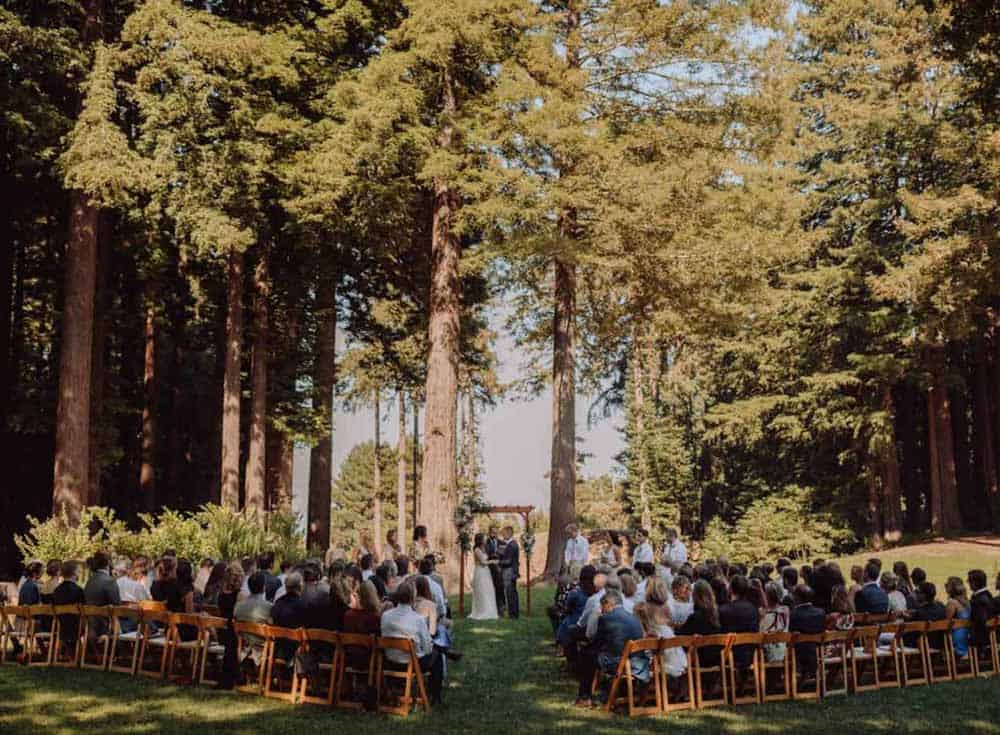Planning a wedding is a monumental task that requires careful organization, attention to detail, and effective communication. It is truly a joyous occasion, but the sheer number of decisions to be made in advance of the wedding can be overwhelming. From choosing the venue to selecting the perfect dress, planning a wedding involves many choices that contribute to creating a memorable and seamless celebration. In this comprehensive guide, we will explore the step-by-step process of planning a wedding, offering insights and tips to help couples navigate this exciting journey.

1. Establish a Budget: The first step in planning a wedding is setting a realistic budget. Determine how much you are willing to spend on the entire event, including the ceremony, reception, attire, and other associated costs. Prioritize your expenses based on what matters most to you and your partner.
2. Create a Timeline: Develop a timeline that outlines the key milestones leading up to the wedding day. This includes choosing a date, booking a venue, sending out invitations, and other critical tasks. Having a timeline helps you stay organized and ensures that you have ample time to complete each task without feeling rushed.
3. Choose a Wedding Style: Decide on the overall style and theme of your wedding. Whether it’s a traditional ceremony, a modern affair, a destination wedding, or a rustic celebration, establishing a theme will guide many of your decisions, from the venue to the decor.
4. Draft a Guest List: Sit down with your partner and create a preliminary guest list. This will influence the size of the venue and impact other decisions like catering. Be mindful of your budget and consider how intimate or grand you want your celebration to be.
5. Select a Venue: Choosing the right venue is a pivotal decision. Consider factors such as location, capacity, amenities, and ambiance. The venue should be a reflection of you and your partner and be comfortable for both of you. Schedule visits to potential venues and ask about availability, pricing, and any restrictions they may have. Be sure to ask what furniture items are included to avoid unnecessary rentals. Keep in mind that venues typically book 9-12 months in advance. Oftentimes, the venue will have an “in-house” planning/coordinating team which can be an enormous help on the day of the wedding.
Also see: How To Save Money On Your Wedding Venue
6. Book Vendors: Research and book essential vendors, such as a photographer, videographer, caterer, florist, and entertainment. Check reviews, request quotes, and confirm availability—secure contracts to outline expectations and avoid any misunderstandings. The venue you choose should have a list of recommended vendors that they have worked with before and choose to recommend. This is a good starting place when you start looking for vendors.
7. Find the Perfect Dress: Start shopping for your wedding attire well in advance. Consider the style, color, and budget for both the wedding gown and groom’s attire. Factor in alterations and fittings to ensure a perfect fit.
8. Send Save-the-Dates and Invitations: Once the date and venue are secured, send out save-the-dates to give guests ample notice. Follow up with formal invitations, including essential details like RSVP instructions, dress code, and gift registry information.
9. Plan the Ceremony: Collaborate with your officiant to create a meaningful ceremony. Choose readings, select vows, and decide on any rituals or traditions you want to incorporate.
10. Organize Transportation: Arrange transportation for the wedding party and guests, especially if the ceremony and reception are in a remote location. Confirm the logistics and ensure everyone arrives on time.
11. Finalize Decor and Details: Work on the overall decor and details, such as centerpieces, table settings, and any personalized touches. Ensure that the decor aligns with your chosen theme and colors. Many times, the venue can provide a recommended vendor list to give you options.
12. Plan the Reception: Coordinate with your venue and caterer to create a menu that suits your taste and accommodates any dietary restrictions of your guests. Be sure to taste the food with your caterer to get a sense of their cooking style and to help make your menu selections. Plan the reception timeline, including the entrance, toasts, cake cutting, and the first dance. If your budget permits, a wedding planner and or day-of-event coordinator can help with all of this to make it easier for you and your partner.
13. Create a Backup Plan: Be prepared for unexpected challenges, especially if your wedding is outdoors. Have a backup plan in case of inclement weather or other unforeseen circumstances. If you choose an outdoor venue, consult with them on suggestions for a “backup plan”.
14. Manage RSVPs: Keep track of RSVPs and dietary preferences. Provide your caterer with the final guest count well in advance to ensure they can accommodate your needs.
15. Finalize Legalities: Ensure all legal requirements for marriage are met. Obtain the necessary permits, marriage licenses, and any other documents required by your jurisdiction. Don’t forget to bring this paperwork to the wedding for your officiant to sign.
16. Delegate Responsibilities: As the wedding day approaches, delegate tasks to reliable friends or family members or your day of event coordinator. This can include managing the schedule, coordinating with vendors, distributing gratuities, and handling any last-minute details so you can focus on enjoying yourself!
17. Rehearse and Relax: Rehearse at the venue to familiarize the wedding party with the ceremony and reception plans. Take this time to relax and enjoy the moment before the whirlwind of the wedding day. If you have a day of event coordinator, they will help you orchestrate the rehearsal.
18. Enjoy Your Big Day: On the wedding day, focus on savoring each moment. Trust that you’ve done the necessary planning, and allow yourself to fully immerse in the joy of the occasion. If you choose not to have a day of event coordinator, let someone you trust be the point of contact for questions or decisions that need to be made.
19. Post-Wedding Tasks: After the celebration, don’t forget to send thank-you notes to your guests and vendors. Ensure that all bills are settled, and return any rented items promptly.
20. Wedding Attire and Accessories: Selecting the perfect wedding attire is a significant decision for both the bride and groom. Brides should consider factors such as silhouette, fabric, and neckline that complement their body type. Grooms, on the other hand, should aim for a suit or tuxedo that complements the wedding theme and fits them well. It is also essential to consider accessories such as shoes, jewelry, and the veil, as these details can enhance your overall look and add a touch of personality to your ensemble. When making these selections, prioritize both comfort and style.
21. Wedding Stationery and Paper Goods: Your wedding stationery is an important aspect of your big day. It sets the tone and gives your guests a sneak peek into what they can expect. You can make it more creative by incorporating elements that reflect your wedding theme or personal interests. It is important to ensure that your chosen theme is carried throughout all stationery items, including RSVP cards, menus, and thank-you notes. When selecting paper and printing options, consider factors such as texture, color, and printing techniques to achieve the desired aesthetic.
22. Entertainment and Music: Entertainment plays a vital role in any wedding celebration. It sets the mood and keeps guests engaged throughout the event. You should consider various options such as live bands, DJs, or even unique performers like magicians or acrobats to add an element of surprise. To cater to different parts of the wedding, create playlists that are appropriate for the ceremony, cocktail hour, reception, and dance party. You can further personalize your wedding and leave a lasting impression on your guests by arranging special dances or performances, such as a choreographed first dance or cultural presentations.

Planning a wedding involves a combination of creativity, organization, and thoughtful decision-making. By following these steps and staying organized, couples can navigate the wedding planning process with confidence, ensuring a beautiful and unforgettable celebration of their love. Keep in mind that flexibility and communication are key, and most importantly, enjoy the journey to the altar—the beginning of a new chapter in your lives together!
FAQs
How far in advance should we start planning our wedding?
It’s recommended to start planning your wedding approximately 12 to 18 months in advance, especially if you have a specific date or venue in mind. This allows ample time to secure vendors, book your desired venue, and ensure that all details are carefully coordinated.
How do we determine our wedding budget?
Determining your wedding budget involves considering your financial situation, discussing priorities with your partner, and researching typical costs in your area. Allocate funds to key expenses such as venue, catering, attire, and entertainment, while leaving room for unexpected expenses or last-minute adjustments.
Is it necessary to follow a wedding preparation checklist?
Yes, following a wedding preparation checklist is highly recommended. It serves as a comprehensive roadmap, ensuring that no essential task or detail is overlooked during the planning process. A checklist helps couples stay organized, reduce stress, prioritize tasks efficiently, and maintain control over their wedding planning journey. Ultimately, adhering to a checklist contributes to a smoother, more enjoyable planning experience and helps create the wedding of your dreams.
What common wedding tasks do couples often overlook?
Couples often forget to include tasks like obtaining permits, creating a backup plan for outdoor weddings, and organizing transportation for guests in their wedding to-do lists.

